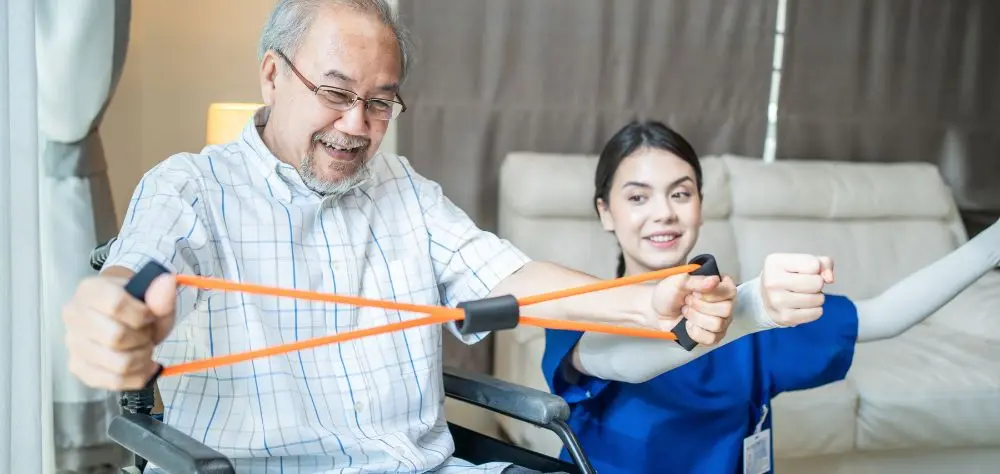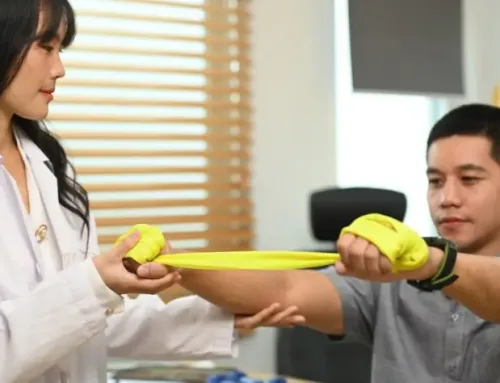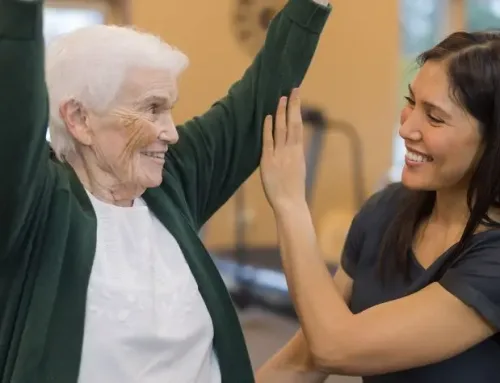Occupational Therapy Degrees: What You Need to Become an OT

If you’re considering a career in occupational therapy, one of the first questions you’ll face is: What degree do you need for occupational therapy? In the United States, becoming a licensed occupational therapist requires completing either a Master of Occupational Therapy (MOT) or a Doctor of Occupational Therapy (OTD) from an accredited program.
Both degrees qualify you to sit for the National Board for Certification in Occupational Therapy (NBCOT) exam, which is mandatory for licensure in all 50 states. Without this credential, you cannot legally practice as an Occupational Therapist. Lets explore how the degree credentials are different.
MOT vs. OTD: Differences Between Occupational Therapy Degrees
Educational Level
Master of Occupational Therapy (MOT)
- Prepares students for entry-level OT roles in healthcare, education, and rehabilitation settings.
- Focuses on foundational clinical skills and patient care.
- Designed for those seeking a fast, focused path into clinical practice.
Doctor of Occupational Therapy (OTD)
- Professional clinical doctorate that prepares students for licensure and advanced career opportunities.
- Covers all MOT-level clinical training, plus advanced coursework in leadership, policy, and systems-based care.
- Emphasizes healthcare innovation, advocacy, and program development.
- Culminates in a doctoral capstone project, applying academic knowledge to specialized, real-world challenges
Importantly, the OTD can also serve as a stepping stone to a PhD. While the OTD is practice-oriented and the PhD is research-focused, students who complete an OTD gain advanced academic experience and research exposure that can support their transition into a PhD program. This is especially relevant for those who aim to become tenure-track faculty, lead large-scale studies, or influence national policy in occupational therapy.
Time to Completion
Master of Occupational Therapy (MOT)
MOT programs usually take 2 to 3 years to complete when pursued full-time. These programs focus on foundational clinical knowledge and fieldwork experience, preparing graduates for licensure and immediate entry into general practice.
Doctor of Occupational Therapy (OTD)
OTD programs typically take 2.5 to 4 years, depending on the structure and whether students are entering with a bachelor’s or transitioning from another OT credential.
However, some programs—such as SCUHS’ Doctorate of Occupational Therapy offers an accelerated format that can be completed in just over 2 years (2 years and 3 months). SCU’s OTD is structured as a hybrid program, combining 80% online coursework with three weeks of immersive in-person training at the end of each term.
Career Opportunities & Advancement
Both MOT and OTD graduates are qualified to work in hospitals, outpatient clinics, rehabilitation centers, schools, and other traditional OT settings. However, the scope and trajectory of career advancement differ.
MOT Graduates:
- Are prepared for entry-level OT positions in a variety of healthcare and educational environments.
- Can pursue specialization through clinical experience or post-professional certifications.
- May need further education to access leadership or academic roles.
OTD Graduates:
- Are equipped for entry-level roles and positioned for higher-level opportunities in clinical leadership, research, program development, and academia.
- Often considered for positions such as rehab department directors, university faculty, or advanced clinical specialists.
- Benefit from expanded skill sets in systems thinking, advocacy, and policy—making them ideal candidates for positions with long-term strategic impact.
At SCU, OTD students graduate with more than a degree—they build specialized credentials that enhance employability. The program includes training that fulfills requirements toward:
- Physical Agent Modality (PAM) Certification in California.
- American College of Lifestyle Medicine (ACLM) Certification Exam eligibility.
These credentials allow students to bring added value to clinical teams and open doors to integrative and preventive health practice areas from day one.
Why Choose SCU’s Doctor of Occupational Therapy Program?
At Southern California University of Health Sciences (SCU), our Doctor of Occupational Therapy (OTD) program is designed for those ready to lead, innovate, and redefine what it means to practice occupational therapy in the 21st century.
Whole Health Approach
As a university grounded in integrative health sciences, the curriculum at SCU is premised on a whole health philosophy grounding occupational therapy education in an interdisciplinary and holistic field of study. Our curriculum emphasizes prevention, lifestyle medicine, and patient-centered care across mind, body, and environment—preparing you to treat the person, not just the diagnosis.
Hybrid Format with Synchronous Learning
SCU’s OTD program offers a flexible 80% online, 20% on-campus hybrid model. Unlike asynchronous learning models, our virtual coursework includes live, synchronous classes led by experienced faculty. These sessions foster real-time engagement, peer interaction, and individualized attention, all while allowing you to study from wherever you are.
Each term includes three-week on-campus immersions where students work in small cohorts to master clinical skills, refine techniques, and apply learning in simulated environments. These sessions take place at SCU’s state-of-the-art Academic Health Center, where students train with standardized patients and cutting-edge equipment.
Advanced Technology Integration
SCU’s curriculum integrates tools that reflect the realities of modern practice, including:
- Virtual reality therapy for immersive patient simulation
- 3D printing for prototyping adaptive devices
- Driving simulators to train for community mobility interventions
- Digital anatomy suites for detailed clinical understanding
These technologies are embedded into core coursework and hands-on labs, giving you early exposure to tools you’ll use in advanced clinical settings.
Mentorship from Leading Faculty
Our OTD students don’t learn alone. With small class sizes and one-on-one mentorship from distinguished faculty like Dr. Heather Thomas, you’ll be guided by experts actively contributing to research, education, and advanced clinical practice.
SCU’s faculty includes published authors, licensed clinicians, and thought leaders in whole health, lifestyle medicine, and occupational justice. This ensures that your education is grounded not just in theory, but in what’s happening at the forefront of the profession today.
Through this mentorship model, students leave not only with a degree, but with a professional network, research experience, and career direction—ready to lead in whatever OT path they pursue.
Doctoral Capstone Project at SCUHS
At SCUHS, OTD students complete a Doctoral Capstone Project rather than a thesis. The project is a transformative experience that allows students to make a meaningful contribution to the field of occupational therapy.
Each capstone is supported by SCU’s expert faculty, interprofessional learning environment, and access to innovative tools mentioned above. By graduation, students don’t just complete a project—they leave with a focused body of work that reflects their passion, elevates their professional profile, and positions them to lead in a specialized area of occupational therapy
Fixed Tuition Guarantee
Higher education costs shouldn’t be a guessing game. That’s why we offer a fixed tuition guarantee, so students know exactly what they’ll pay from start to finish—no surprise fees, no tuition hikes. It’s a commitment to transparency, making the investment in an OT career as straightforward as possible.
Ready to Take the First Step in Your OT Career?
Choosing between an MOT and an OTD depends on your long-term goals and the level of impact you want to make as an occupational therapist. Both degrees qualify you for licensure and clinical practice—but the OTD goes further. It offers advanced preparation in leadership, research, program development, and emerging areas of specialization. As the profession continues to evolve, earning a doctorate positions you for greater opportunities and long-term career growth.
At Southern California University of Health Sciences, our Doctor of Occupational Therapy program is designed for those ready to lead, innovate, and make a broader difference in healthcare. With a flexible hybrid format, cutting-edge tools, and faculty mentorship from leaders in the field, SCU prepares you not just for licensure—but for what’s next. Explore our admission requirements today and take the next step toward your OTD.
FAQs
Can I apply to SCU’s OTD program without a bachelor’s degree?
Yes. SCU’s OTD program offers a direct-entry pathway for students with 90 or more college credits, even if they haven’t earned a bachelor’s degree. This unique structure is ideal for students who want to fast-track their education, licensed OTAs ready to advance, or career changers looking for an efficient, high-impact route into occupational therapy.
Do employers prefer OTD graduates over MOT graduates?
While both degrees qualify you to work as an OT, many employers prefer an OTD for leadership roles, specialized positions, and academic careers. The field is shifting toward doctoral-level education, similar to what happened in physical therapy.
Does SCU offer a flexible OTD program?
Our hybrid OTD program allows students to complete 80% of coursework online, with short in-person training sessions for hands-on learning. This makes it possible to earn your doctorate while balancing work and life commitments.
How long does it take to complete SCU’s OTD program?
Our OTD program takes just over two years to complete, allowing students to earn their doctorate faster than traditional programs while still gaining the clinical experience and training needed for success.
Is the OTD a good option if I want to pursue a PhD later?
Absolutely. While the OTD is a clinical doctorate focused on advanced practice, leadership, and innovation, it also builds a strong foundation in research and critical thinking. Many students use the OTD as a stepping stone to a PhD or research-intensive career, especially if they’re interested in contributing to academic scholarship, influencing healthcare policy, or leading large-scale clinical studies. SCU’s curriculum includes advanced research training and a mentored capstone project—ideal preparation for future doctoral-level study.
Related Posts




